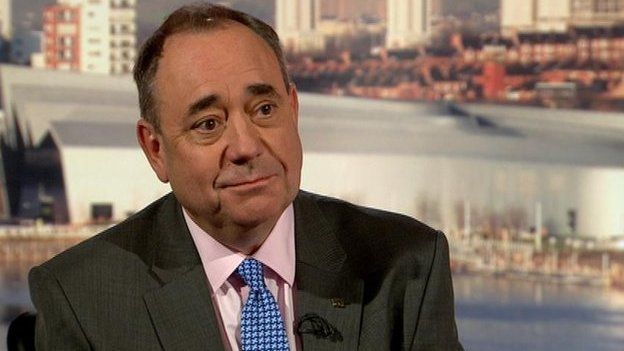Scottish independence: Alex Salmond says Eurosceptics 'damaging Scotland'
- Published

The Scottish first minister has claimed the "politics of Euroscepticism" at Westminster are "deeply damaging" for Scotland.
Alex Salmond said the prospect of an in/out referendum risked Scotland being "dragged out" of the EU.
On Thursday, CBI director Sir Mike Rake warned that businesses across the UK were concerned about an EU referendum.
But Prime Minister David Cameron said it was "important to confront the big issues".
Mr Cameron has promised a referendum on the UK's membership of the EU if the Conservatives win the next general election.
Several Eurosceptic backbenchers have become disillusioned with his approach, with one - Douglas Carswell - announcing on Thursday that he was joining UKIP.
'Constructive relationship'
Speaking to BBC Radio's Good Morning Scotland programme, Mr Salmond said he did not believe there was "any wish" in Scotland for the country to leave the EU.
He added: "I think, on the contrary, the politics of Euroscepticism that we see in Westminster are deeply damaging for Scotland, and could be even more damaging if we are dragged out of Europe.
"I think we should get on with building a constructive relationship with the rest of our partners across the European continent. I think that is very much the trend of the outward looking, internationalist approach of the people who believe in an independent Scotland."
The Scottish government wants Scotland to remain part of the EU in the event of independence, and has argued that the terms of continuing membership could be negotiated in time for the first day of independence.
But pro-UK supporters claim Scotland would need to apply from the outside alongside other candidate countries such as Turkey, Iceland and Serbia.
Mr Salmond said next month's referendum on Scottish independence was very different to the referendum on European Union membership promised by the prime minister.
He said: "Generally speaking, and I'm not saying this is a universal law, you hold a referendum if you are looking for the wishes of the people, the assent of something you want to do.
"You don't hold a referendum normally for something you don't want to do. That's the ridiculous position that David Cameron has now got himself into.
"Whether you regard that as a humiliation, as the front page of the Herald newspaper says today, or just deeply misguided, from a Scottish perspective is neither here nor there, because whether Mr Cameron is humiliated or not is not the debate in Scotland.
"The debate in Scotland is that we should not place ourselves in the position, given that we are only 8% of the UK population, of potentially being dragged out of the European Union against our wishes, against our will, which might be the position if we are foolish enough to have a 'No' vote in this referendum."
Would Scotland be in the EU after independence?
The Scottish government says it could negotiate entry from within the EU using Article 48 of the Treaties of the European Union.
Pro-Union voices insist the only available option to an independent Scotland would be applying as a new candidate country via Article 49.
BBC Scotland's Martin Currie has been looking at what these Articles say, and examining the arguments made by experts on both sides of the debate.
Mr Salmond was speaking in the wake of CBI president Sir Mike Rake hitting out at the "uncertainty" being caused by the Conservative proposal to hold a referendum on the EU in 2017 as he addressed a business dinner in Glasgow, attended by the prime minister.
He told the CBI Scotland annual dinner that the proposed EU referendum - along with other political events such as the vote on Scottish independence in three weeks' time and next year's general election - "contribute their own specific share of uncertainty".
Sir Mike, chairman of BT Group and deputy chairman of Barclays, said that, while the "EU's not perfect", the CBI had concluded "unequivocally, that we are best served by remaining in the EU and seeking reforms which will expand our collective prosperity".
He added: "We accept that calling a referendum on EU membership is a constitutional issue for government, but the ambiguity has already and is increasingly causing real concern for businesses regarding their future investment plans."
'Public support'
But Mr Cameron dismissed fears that his strategy was "disadvantaging Britain in terms of investment".
He told the audience of business figures: "Of course I want to end uncertainty, whether over the future of the United Kingdom or the future of the United Kingdom within the European Union.
"But I think in modern politics if you want to trust people and take them with you, you can't maintain those relationships without public support.
"I have a strategy which is about getting the changes we need and then holding a referendum in which I believe Britain should stay in a reformed European Union, I think that is the right answer."
He added: "Where I would disagree with Mike is I don't think this strategy is disadvantaging Britain in terms of investment.
"I see Nissan, Honda, Toyota investing in massively into our car industry, I see Chinese businesses investing all across Britain. The quantity of inward investment coming into Britain, it outstrips anything happening in any other European country."